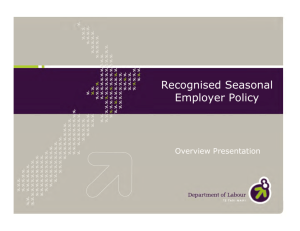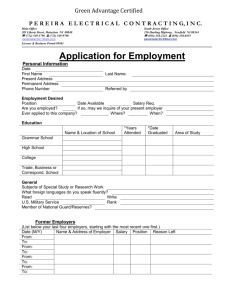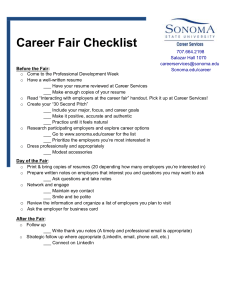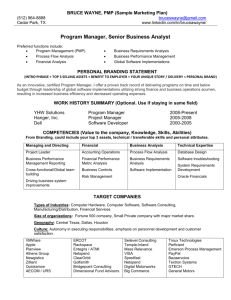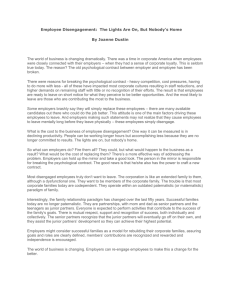RSEpackforbeehive release
advertisement
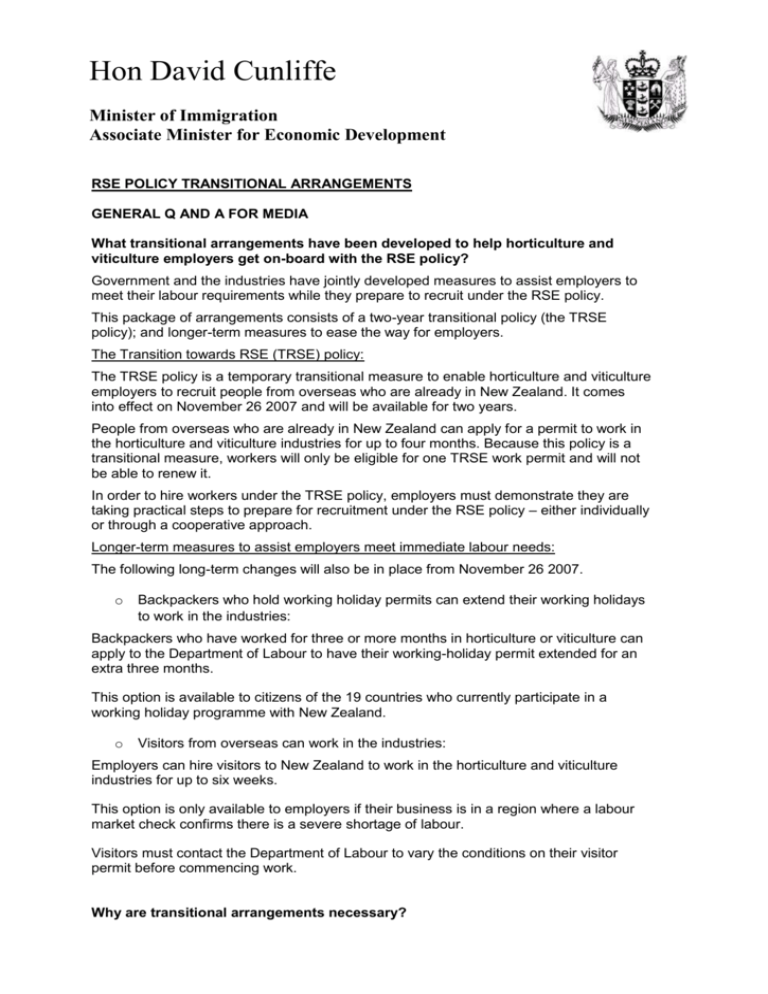
Hon David Cunliffe Minister of Immigration Associate Minister for Economic Development RSE POLICY TRANSITIONAL ARRANGEMENTS GENERAL Q AND A FOR MEDIA What transitional arrangements have been developed to help horticulture and viticulture employers get on-board with the RSE policy? Government and the industries have jointly developed measures to assist employers to meet their labour requirements while they prepare to recruit under the RSE policy. This package of arrangements consists of a two-year transitional policy (the TRSE policy); and longer-term measures to ease the way for employers. The Transition towards RSE (TRSE) policy: The TRSE policy is a temporary transitional measure to enable horticulture and viticulture employers to recruit people from overseas who are already in New Zealand. It comes into effect on November 26 2007 and will be available for two years. People from overseas who are already in New Zealand can apply for a permit to work in the horticulture and viticulture industries for up to four months. Because this policy is a transitional measure, workers will only be eligible for one TRSE work permit and will not be able to renew it. In order to hire workers under the TRSE policy, employers must demonstrate they are taking practical steps to prepare for recruitment under the RSE policy – either individually or through a cooperative approach. Longer-term measures to assist employers meet immediate labour needs: The following long-term changes will also be in place from November 26 2007. o Backpackers who hold working holiday permits can extend their working holidays to work in the industries: Backpackers who have worked for three or more months in horticulture or viticulture can apply to the Department of Labour to have their working-holiday permit extended for an extra three months. This option is available to citizens of the 19 countries who currently participate in a working holiday programme with New Zealand. o Visitors from overseas can work in the industries: Employers can hire visitors to New Zealand to work in the horticulture and viticulture industries for up to six weeks. This option is only available to employers if their business is in a region where a labour market check confirms there is a severe shortage of labour. Visitors must contact the Department of Labour to vary the conditions on their visitor permit before commencing work. Why are transitional arrangements necessary? The RSE policy was developed in close consultation with industry, to provide the core labour supply for the industries on a sustainable basis. Take-up of the policy by industry continues to be positive. However, industry feedback also indicates that despite their best efforts, some employers need more time and assistance to get on-board with the policy. This transitional package eases the way for employers who need this extra help. The transitional arrangements provide a stepping stone for employers aiming to recruit under the RSE policy – they are not a long-term solution. What do employers need to do to show they are moving to recruit under the RSE policy, in order to recruit workers under the Transition towards RSE (TRSE) policy? To hire workers under the TRSE policy, employers must demonstrate they are working to get on-board with the RSE policy. While the TRSE policy is available for two years, it is expected that most employers will move to recruiting under the RSE policy during this time – either individually or through a cooperative approach. Employers who need to recruit under the TRSE policy in the 2007/2008 year need to demonstrate their commitment to recruiting available New Zealanders, and providing good employment standards before being able to hire overseas people currently in New Zealand. Employers who need to recruit under the TRSE policy in the 2008/2009 year must show they are on the pathway to accessing RSE labour - either individually or through a cooperative approach. Assistance for employers to use the transitional policy and move to RSE as soon as possible will be available through new Regional RSE Transition Facilitators (see further information below). Are the current policies available to horticulture and viticulture employers (the Approval in Principle process and seasonal work permits) still being discontinued? As previously announced, from September 30 2007 horticulture and viticulture employers will no longer be able to recruit workers under the Approval in Principle process or the Seasonal Work Permit Pilot. What about employers whose current workers’ permits expire on September 30? How will they get workers before the start of TRSE policy at the end of November? Employers who have a real need for workers to remain after 30 September should contact the Department before the workers’ permits expire, to see if they are able to be issued a short term general work permit. What help is available to employers to understand their options and help them prepare to recruit under the RSE policy? Assistance for employers will be available through new Regional RSE Transition Facilitators, who will be based around New Zealand. These facilitators will work closely with industry bodies, unions and government agencies. Facilitators are currently being recruited. How many employers have already signed up for RSE status, and how many Pacific workers have been recruited under the RSE policy? As of 31 August, nearly 70 horticulture and viticulture employers had applied for RSE status; including a co-operative representing over 30 employers. This group of employers have indicated that they plan to recruit over 5,600 Pacific workers under the RSE policy. Changes to Recognised Seasonal Labour Policy and Transitional Arrangements Scheme Existing Policy New Policy Working Holiday Scheme (WHS) People aged 18 to 30, from 22 countries can obtain a WHS visa before they leave their home country to be in NZ for up to 12 months (23 months for the UK), working for up to 3 months for any one employer. Overseas visitors with a WHS visa who have already worked for 3 months in the horticulture/viticulture industry in NZ can extend their permit for a further 3 months. This is ongoing and not linked to RSE. Variation of Conditions (VOC) Transition to RSE Scheme Year One, Oct 07 to Sept 08 Visitors or students already in NZ who have been offered work can apply for a ‘variation of conditions’ to get a temporary work permit for one month. A shortage of NZ labour must be declared. People in NZ on a valid visitor permit with an offer of work can apply for a VOC, which can be for up to 6 weeks. It is linked to one employer – no regional movement. Did not exist Growers moving towards RSE can become TRSE. This requires a commitment to become RSE. A shortage must be declared, but there will be ‘express’ turnaround for permits. Ongoing. Must offer employment contract (average of 30 hours work/week for duration of employment, access to ACC). Can then employ people on a valid visitors permit for four months with an additional two weeks training time on an exceptions basis. This policy utilises work permit policy. Year Two, Oct 08 – Sept 09 Did Not Exist As for Year One, but must have a transition plan in place. BACKGROUND ON THE RSE POLICY: What is the RSE policy? From September 2007, the Recognised Seasonal Employer policy will be the main avenue for horticulture and viticulture employers to recruit seasonal labour off-shore. The cornerstone of the RSE policy is to ensure New Zealanders have first opportunities at jobs. Once it has been determined that there are no workers available locally, employers can apply to recruit from the Pacific. Successful applicants can stay in New Zealand for seven months during any 11 month period. They cannot transfer to another permit while they are in New Zealand and must leave at the end of their stay. The RSE policy is initially capped at 5,000; however, the number of available places can be varied by the Minister of Immigration depending on the forecast of New Zealanders available and industry demand, generated by the Department of Labour and the Ministry of Social Development. Why is the Recognised Seasonal Employer policy necessary? New Zealand’s low unemployment and global competition for low skilled labour has led to an increase in labour shortages – especially in the horticulture and viticulture industries. In order to remain competitive with the rest of the world with quality, innovation and productivity, the horticulture and viticulture industries require an ongoing supply of labour to fill seasonal shortages. The RSE policy is about creating a sustainable labour supply for the industries – and reflects the aims of the Seasonal Labour Strategy for the Horticulture and Viticulture industries, developed between industry and government. How does the Recognised Seasonal Employer policy work? Employers can apply to recruit overseas workers under the Recognised Seasonal Employer policy only when there are no New Zealanders available to do the work. To recruit overseas workers, an employer must apply for Recognised Seasonal Employer status through the Department of Labour. To gain recognition, an employer must provide evidence of good workplace practices, the ability to pay market rates and a commitment to providing pastoral care for workers. Once an employer gains recognition, it initially lasts for two years. Once an employer has recognition, they can submit an Agreement to Recruit application to the Department of Labour, which outlines how many workers they need, where they plan to recruit from, and other details around the employment of overseas workers and how they can meet responsibilities. Although employers must submit a new application each season, they are likely to choose to recruit workers they have employed (and upskilled) in previous seasons. The next step is for workers to apply for work visas. Applicants must meet health and character requirements, and show evidence of arrangements to leave New Zealand at the end of their stay. Which Pacific countries will employers be able to recruit from? Employers will be able to recruit from the Federated States of Micronesia, Papua New Guinea, Kiribati, Nauru, Palau, the Republic of Marshall Islands, Solomon Islands, Tonga, Tuvalu, Samoa and Vanuatu. In order to kick-start the scheme, to help employers access Pacific labour quickly, New Zealand is helping some Pacific countries to develop special facilitative measures to prepare workers and arrange pastoral care for their time in New Zealand. These countries are Kiribati, Samoa, Tonga, Tuvalu and Vanuatu. What are the benefits for employers? Employers will benefit from an increasingly skilled and productive group of Pacific workers – as employers will be able to recruit the same workers year after year. In addition, employers will be able to plan for their upcoming labour needs, instead of being reliant on labour being available at the time they need it. How many employers have signed up for RSE status to date? As of 31 August 2007, the Department of Labour had either approved or was considering nearly 70 RSE status applications. This figure includes a co-operative representing over 30 employers. Early indications from this group of employers are that they are looking to employ around 5,600 seasonal workers under the RSE policy. ENDS


